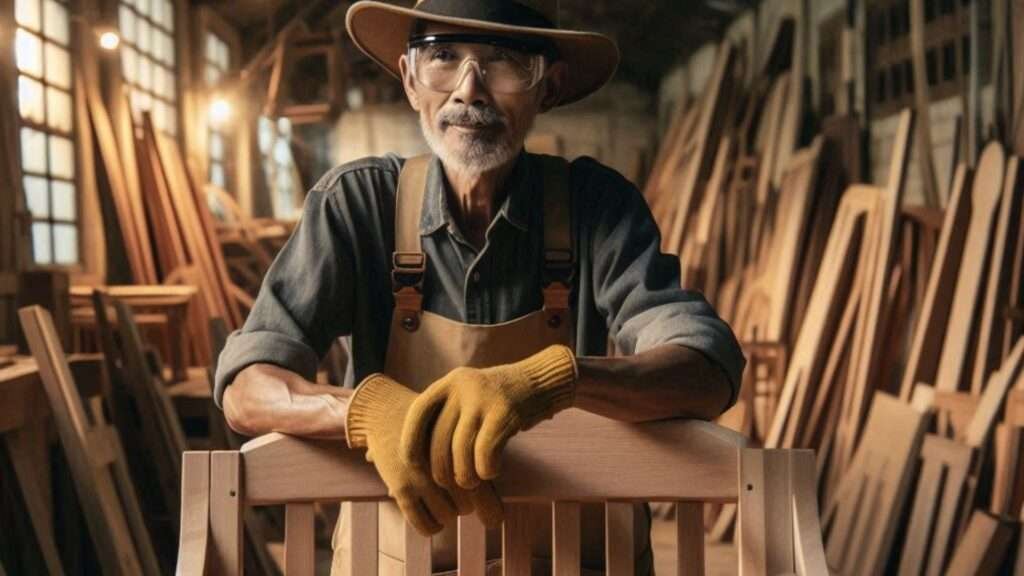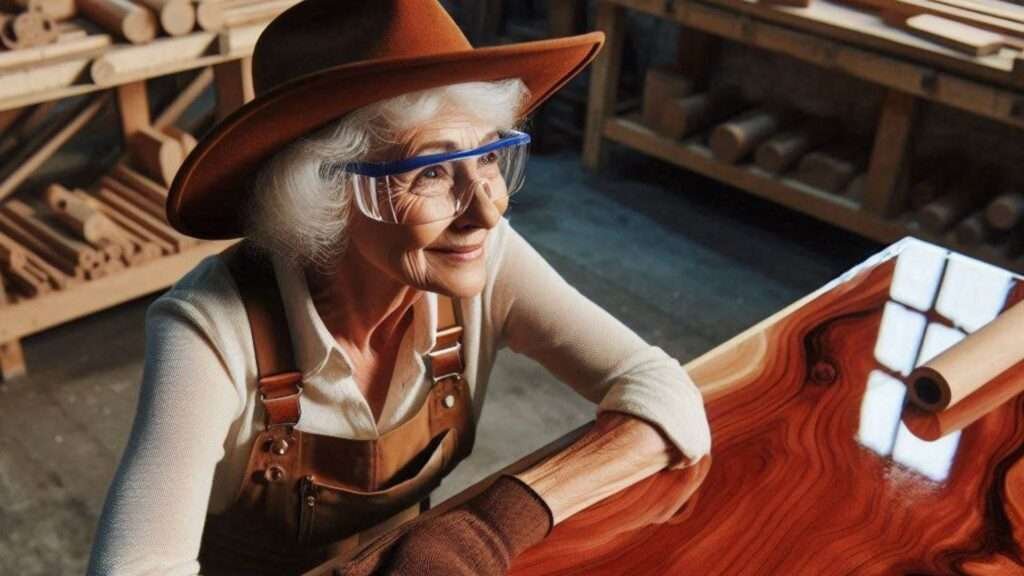Woodworking Can Be A Great Hobby.
Woodworking is a fascinating and ancient craft that has withstood the test of time and continues to captivate enthusiasts worldwide.
Woodworking is a hobby that appeals to people of all backgrounds and skill levels.
Its universal appeal stems from the harmonious combination of creativity, practicality, and the satisfaction gained from transforming raw materials into functional and artistic works.
One of the foremost attractions of woodworking is its accessibility. Beginners can start with basic tools and simple projects, gradually advancing to more complex undertakings as their skills improve.
This gradual learning curve ensures that woodworking remains engaging and rewarding, regardless of one’s initial proficiency.
Furthermore, the availability of a plethora of online resources, workshops, and community groups makes it easier than ever for newcomers to get started and find support.
Woodworking is a hobby that imparts a multitude of benefits. It enhances fine motor skills, fosters problem-solving abilities, and encourages patience and perseverance.
Additionally, it provides a creative outlet, allowing individuals to express their artistic vision while crafting tangible objects.
The physical act of working with wood can also be therapeutic, offering a sense of calm and accomplishment that is often elusive in our fast-paced, digital world.
Moreover, woodworking is not just about creating; it also involves a deep appreciation for the material itself.
Understanding the characteristics of different types of wood, their grain patterns and how they respond to various tools and finishes, adds a layer of depth to the craft.
This knowledge empowers woodworkers to make informed choices, resulting in higher-quality projects that stand the test of time.
In the sections that follow, we will delve deeper into the various facets of woodworking, exploring its rich history, the essential tools and techniques, and the numerous ways it can enrich one’s life.
Whether you are a seasoned craftsman or a curious beginner, the world of woodworking offers endless possibilities for growth, creativity, and fulfillment.
The Therapeutic Benefits Of Woodworking.
Woodworking is more than just a hobby; it serves as a therapeutic outlet for many individuals.
Engaging in woodworking offers a calming effect, as the repetitive nature of tasks such as sanding, cutting, and assembling can be meditative.
The sensory experience of working with wood is amazing, from the tactile feel of the material to the soothing sounds of tools, it provides a unique form of relaxation that is hard to find elsewhere.
Creating something tangible from raw materials brings about a profound sense of satisfaction.
The process of designing, crafting, and finishing a piece allows woodworkers to see the direct results of their efforts, fostering a deep sense of accomplishment.
This tangible outcome not only boosts self-esteem but also offers a creative outlet that can be particularly satisfying in our increasingly digital world.
Moreover, woodworking has been shown to reduce anxiety and stress.
There are plenty of evidential articles around supporting that engaging in creative activities like woodworking can lead to increased well-being and lower stress levels.
Hands-on activities demand focus and concentration, which can help divert attention from daily worries and mental clutter.
This cognitive shift allows individuals to enter a state of flow, where time seems to pass effortlessly, further contributing to mental tranquility.
The benefits of woodworking are many and varied and I personally feel that engaging in this craft can be potentially be an effective way to combat anxiety and depression.
The act of working with one’s hands can be incredibly grounding, promoting a sense of present-moment awareness, which is essential for mental health.
Incorporating woodworking into daily or weekly routines can thus serve as a powerful tool for mental well-being.
Whether you’re crafting a simple birdhouse or an intricate piece of furniture, the therapeutic benefits of woodworking make it an ideal hobby for anyone looking to enhance their mental health.
The Relaxation and Stress Relief That Comes With Woodworking.
Woodworking is more than just a pastime; it can be a sanctuary from the stress of daily life.
The rhythmic sound of a saw cutting through wood, the smell of freshly sanded timber, and the tactile sensation of smoothing out a rough piece of lumber can offer a unique form of relaxation.
I find that my time in the woodworking shed as an escape, a place where I can lose myself in the craft and leave all worries behind.
Spending just a couple of hours in the shed making something out of wood after a stressful day can significantly clear the mind.
The act of focusing on precise measurements, cuts, and assembly requires a level of concentration that naturally shifts attention away from daily stressors.
This mental engagement can be incredibly soothing and provides an immediate sense of accomplishment upon completing even the smallest tasks.
There’s something about shaping a piece of wood with my hands that clears my mind. It’s therapeutic, almost meditative.
I come out of my shed feeling refreshed and ready to tackle the next day.
Woodworking has been my go-to stress relief for years. When I’m sanding or carving something out of a really lovely smelling wood like Cedar, Pine, Cherry or Walnut, the combination of the work and the smell provides me with a sense of peace that I can’t find anywhere else.
It’s my way of unwinding and reconnecting with a better version of myself.
Woodworking not only serves as a creative outlet but also as a means of achieving mental clarity and emotional balance.
The satisfaction derived from crafting something tangible from scratch can be profoundly rewarding, making woodworking an ideal hobby for relaxation and stress relief.
Mindfulness and Focus From Woodworking.
Woodworking serves as an excellent conduit for enhancing mindfulness and focus. The very nature of the craft demands a high level of concentration and attention to detail, which inherently cultivates a state of presence and mental clarity.
When engaging in woodworking, individuals must take precise measurements and execute accurate cuts.
This meticulous process requires a deep level of focus, effectively anchoring them in the present moment and allowing them to temporarily set aside external distractions and stressors.
The act of working with wood, from planning and measuring to cutting and assembling, necessitates a singular focus that can be both calming and mentally invigorating.
As we immerse ourselves in our work, we frequently experience a state of flow in which time appears to stand still and our attention is completely absorbed by the task at hand.
This immersive experience not only sharpens cognitive abilities, but it also improves my overall mental health; I always leave the shed feeling much better than when I entered.
Practicing woodworking on weekends can be particularly beneficial for mental clarity and focus as one transitions into the week ahead.
Engaging in such a hands-on, creative hobby provides a mental reset, enabling individuals to start the week with a refreshed and clear mind.
This can be especially advantageous if you’ve got a job that doesn’t allow you to walk around during the day, some jobs are very digitally-driven and being in front of a computer all day long often makes me feel mental fatigue and burnout, especially if it’s a long day.
The tangible sense of accomplishment upon completing a woodworking project can boost self-esteem and provide a sense of purpose.
This positive reinforcement further enhances one’s ability to concentrate and remain mindful in other areas of life.
By regularly practicing woodworking, we can develop a more focused, present mindset, which can translate to improved performance and satisfaction in both personal and professional spheres.
Creativity and Self-Expression Via Woodwork.
Woodworking stands as a remarkable avenue for creativity and self-expression. The art of transforming plain wood into beautifully crafted items offers an infinite scope for imaginative endeavor.
Whether you are carving intricate designs or constructing functional furniture, woodworking caters to a vast range of creative projects.
This diversity allows enthusiasts to explore their artistic inclinations and craft items that reflect their personal style.
One of the most captivating aspects of woodworking is the variety of projects one can undertake.
Artistic carvings, for instance, enable woodworkers to create detailed sculptures and ornamental pieces that embody their artistic vision.
These projects often require precision and a keen eye for detail, which can be incredibly rewarding for those passionate about fine craftsmanship.
On the other hand, functional woodworking projects such as building furniture provide a different form of satisfaction.
Creating a sturdy table, a comfortable chair, or a custom bookshelf not only serves a practical purpose but also allows for self-expression through design and construction.
Each piece of furniture can be tailored to fit specific needs and preferences, making it a unique addition to any home.
Personalized projects and DIY home décor further amplify the creative potential of woodworking.
By crafting custom picture frames, decorative shelves, or even unique kitchen accessories, woodworkers can infuse their living spaces with personalized touches that reflect their individuality.
These projects often blend functionality with aesthetics, showcasing the creator’s skill and creativity.
In essence, woodworking is not just a hobby; it is a medium through which individuals can express their creativity and unique personalities.
The endless possibilities for customization and the satisfaction derived from creating something tangible make woodworking a fulfilling and enriching pursuit for people of all ages and skill levels.
Whether you are a seasoned artisan or a novice, the world of woodworking offers an open canvas for your creative spirit.
Practical Life Skills That Come Via Woodworking.
Engaging in woodworking offers a multitude of practical life skills that are not only beneficial but also transferable to various aspects of everyday life.
One of the most prominent skills acquired through woodworking is problem-solving. Woodworkers are constantly faced with challenges, whether it involves selecting the right type of wood, accurately measuring dimensions, or figuring out how to piece parts together.
Each project demands critical thinking and innovative solutions, fostering a mindset that is adept at tackling complex issues.
Another invaluable skill honed through woodworking is attention to detail. Precision is paramount in this craft, as even minor discrepancies can affect the final product’s functionality and aesthetics.
This meticulousness translates well into other areas, encouraging individuals to adopt a thorough and careful approach in their personal and professional lives.
Patience is another virtue that woodworking instills. Crafting a piece of furniture or a decorative item is a time-consuming process that requires perseverance.
The gradual progress teaches individuals the importance of steady effort and the rewards of diligence.
This patience often extends beyond the workshop, helping individuals navigate life’s challenges with a calmer and more composed attitude.
The sense of accomplishment that comes from completing a woodworking project cannot be overstated.
The tangible results of one’s effort provide a profound sense of fulfillment and pride.
This boost in self-esteem and confidence often motivates individuals to pursue other goals with renewed vigor, fostering personal growth.
Moreover, the skills learned in woodworking are remarkably transferable. The problem-solving abilities, attention to detail, patience and sense of accomplishment can enhance one’s performance in various fields, from engineering and architecture to project management and daily household tasks.
Ultimately, woodworking cultivates practical life skills that contribute significantly to an individual’s overall development and well-being.
The Affordability and Accessibility Of Woodworking.
Woodworking stands out as an exceptionally budget-friendly and beginner-friendly hobby, making it accessible to a wide audience.
One of the primary reasons for its affordability is the variety of tools and materials available at different price points.
For those just starting, basic hand tools such as hammers, saws, and chisels can be acquired at relatively low costs.
As one gains experience and interest, they can gradually invest in more advanced equipment like power tools and specialized machinery.
Moreover, woodworking materials range from inexpensive softwoods to more costly hardwoods, providing options for every budget.
Beginners can start with affordable plywood or pine, which are widely available and easy to work with. For those interested in more intricate projects, materials such as oak or walnut can be considered once they feel more confident in their skills.
Another aspect that enhances the accessibility of woodworking is the minimal investment required to get started.
Many beginners can commence their woodworking journey with basic tools and scraps of wood, often sourced from local hardware stores or even reclaimed from old furniture.
This approach not only minimizes initial costs but also promotes sustainability by reusing materials.
Space considerations are also important, particularly for individuals with limited room.
Fortunately, woodworking can be adapted to small spaces. Portable workbenches and compact tools are available for those who may not have a dedicated workshop.
Additionally, many woodworking projects can be executed on a small scale, making it feasible to work in apartments or other confined areas.
The combination of affordability, minimal initial investment, and adaptable space requirements ensures that woodworking remains an accessible and inclusive hobby.
Whether one is a novice or has limited resources, the path to creating beautiful and functional items from wood is open to all, making woodworking a truly universal pastime.
Community and Woodwork Knowledge Sharing.
One of the most enriching aspects of woodworking is the sense of community it fosters. Engaging with fellow woodworkers through clubs and online platforms not only enhances your skills but also establishes a network of like-minded individuals who share a passion for the craft.
Joining woodworking clubs provides an opportunity to learn from experienced artisans, receive constructive feedback, and participate in collaborative projects. These clubs often organize workshops, exhibitions, and competitions, which can be incredibly motivating and educational.
In the digital age, platforms like YouTube have become invaluable resources for woodworkers of all levels. Sharing your woodworking projects online allows you to reach a global audience, receive diverse feedback, and learn new techniques from a multitude of content creators.
YouTube channels dedicated to woodworking often feature tutorials, tool reviews, and project ideas that can inspire your next creation.
The comment sections and discussion forums further enhance this community experience, enabling woodworkers to connect, share insights, and troubleshoot challenges together.
Passing down woodworking knowledge is not just about teaching skills but also about fostering a deep appreciation for the craft in future generations.
Involving our kids and grandkids (for us older ones) in woodworking projects can be a wonderful way to bond while imparting valuable skills.
Simple projects, such as building a birdhouse or a small piece of furniture, can ignite a youngster’s interest and provide a sense of accomplishment.
This tradition of knowledge sharing ensures that the art of woodworking continues to thrive and evolve, preserving its legacy.
By engaging in community and knowledge-sharing activities, woodworkers not only enhance their own abilities but also contribute to a vibrant, supportive network that celebrates and perpetuates the craft.
Whether through local clubs or global online platforms, the woodworking community plays a crucial role in enriching the hobby for everyone involved.
Conclusion: Why Not Start Your Woodworking Journey Today?
Woodworking is a hobby that offers a multitude of benefits, making it an ideal pursuit for individuals of all ages and skill levels.
Throughout this article, I’ve been sharing info about the therapeutic, practical, and creative advantages that come with engaging in woodworking.
From the stress-relieving and meditative qualities of working with wood to the satisfaction of creating functional and beautiful pieces, woodworking enriches both the mind and body.
One of the most compelling aspects of woodworking is its therapeutic nature. The process of crafting something tangible with your hands can be incredibly meditative, providing a much-needed respite from the digital world and daily stressors.
The focus and concentration required in woodworking allow you to be present in the moment, fostering a sense of mindfulness that can improve overall well-being.
In addition to being therapeutic, woodworking is immensely practical. The skills you acquire can be applied to a wide range of tasks around the home, from simple repairs to creating custom furniture.
The ability to build and fix things not only saves money but also instills a sense of accomplishment and self-reliance.
Creatively, woodworking offers endless possibilities. Whether you’re designing intricate carvings or constructing minimalist furniture, the creative freedom in woodworking is boundless.
This creative outlet can be incredibly fulfilling, allowing you to express yourself and bring your artistic visions to life.
If you’re ready to start your woodworking journey, consider beginning with simple projects to build your confidence and skills.
Resources such as online tutorials, woodworking classes, and community workshops are excellent places to start.
Investing in basic tools and materials will set you on the right path, and as you progress, you can gradually expand your workshop.
Embarking on woodworking as a hobby can unlock a lifetime of rewards. It is a pursuit that grows with you, offering new challenges and opportunities for growth at every turn.
So, grab some tools, find a project that excites you, and start your woodworking journey today.
The benefits you’ll reap will be well worth the effort.








